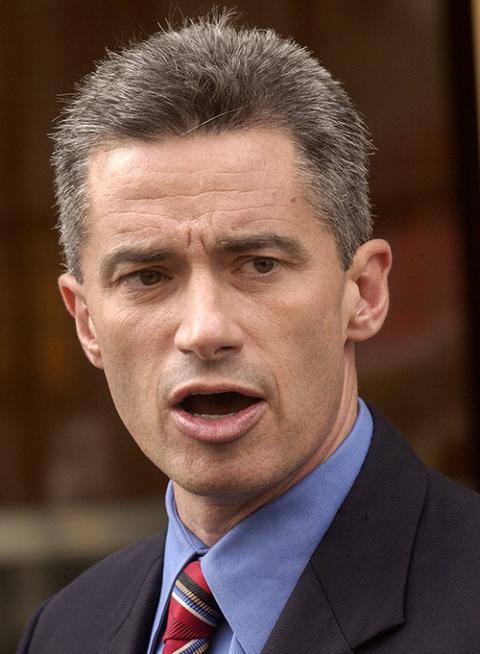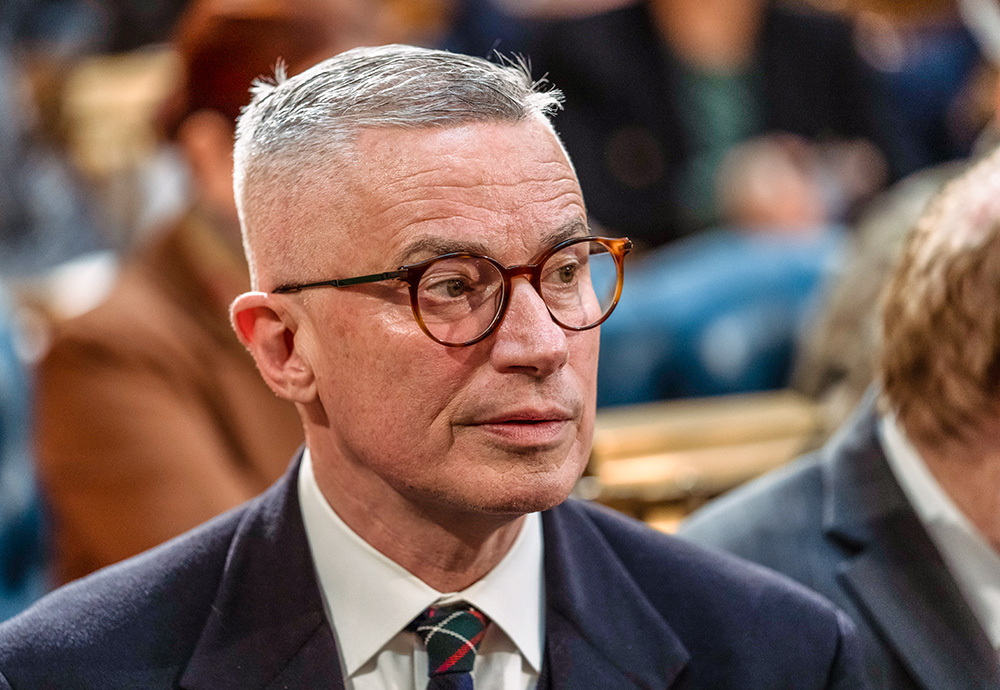
Former New Jersey Gov. Jim McGreevey is seen before current Gov. Phil Murphy delivers his State of the State address to a joint session of the Legislature at the statehouse in Trenton, New Jersey, Jan. 10, 2023. (AP/Matt Rourke)
In August 2004, New Jersey Gov. Jim McGreevey, a cradle Catholic who was then 47, stood in front of a press conference addressing a career-killing political scandal. He was joined by his wife, Dina Matos, and his parents, Jack McGreevey, a former Marine drill instructor, and his mother, Veronica, a nurse.
The script in these cases usually calls for the politician to be unrepentant, to pledge to fight on, with the family there as props amid allegations of corruption. Yet McGreevey took a more humble tone.
He added a line that will be the lead of his future obituary, revealing a truth he hid until that moment.
"I am a gay American," McGreevey said, announcing he would be stepping down as governor that fall. Those five words, the most famous of McGreevey's political life, were uttered as he also declared his guilt for appointing an Israeli national named Golan Cipel to the state's top security job. The press conference occurred after Cipel threatened to sue the governor for sexual harassment.
McGreevey is hoping that those five words will not be the last of his political life. Two decades later, McGreevey is amid a personal reentry that includes a fresh connection with the Catholic faith, inspired in part, he says, by Pope Francis. His journey is proof that there can be second acts in American life, testing the voting public's forgiveness and memory.
Advertisement
He's announced a return to politics as a candidate in the 2025 mayoral race in Jersey City, located in the shadow of the Statue of Liberty on the Hudson River. Population 292,000, Jersey City is part gleaming metropolis, a favored residence for Wall Street traders who have gobbled up condos, and part hardscrabble immigrant minority city, the place where McGreevey's grandparents first came to as Irish immigrants before moving to the suburbs.
Twenty years later, the McGreevey scandal may appear relatively minor to a voting public that has endured the Trump era. But 2004 was different. Just a few years after New Jerseyans watched the World Trade Center fall, terrorism was a prime concern across the metropolitan region. The job for the governor's alleged male paramour — Cipel denied a sexual relationship — was too important for one with dubious qualifications.
McGreevey had violated his marital vows, and it happened when Americans were more suspicious of LGBTQ people in politics. That year, President George W. Bush would win reelection, in part on a promise to oppose gay marriage.
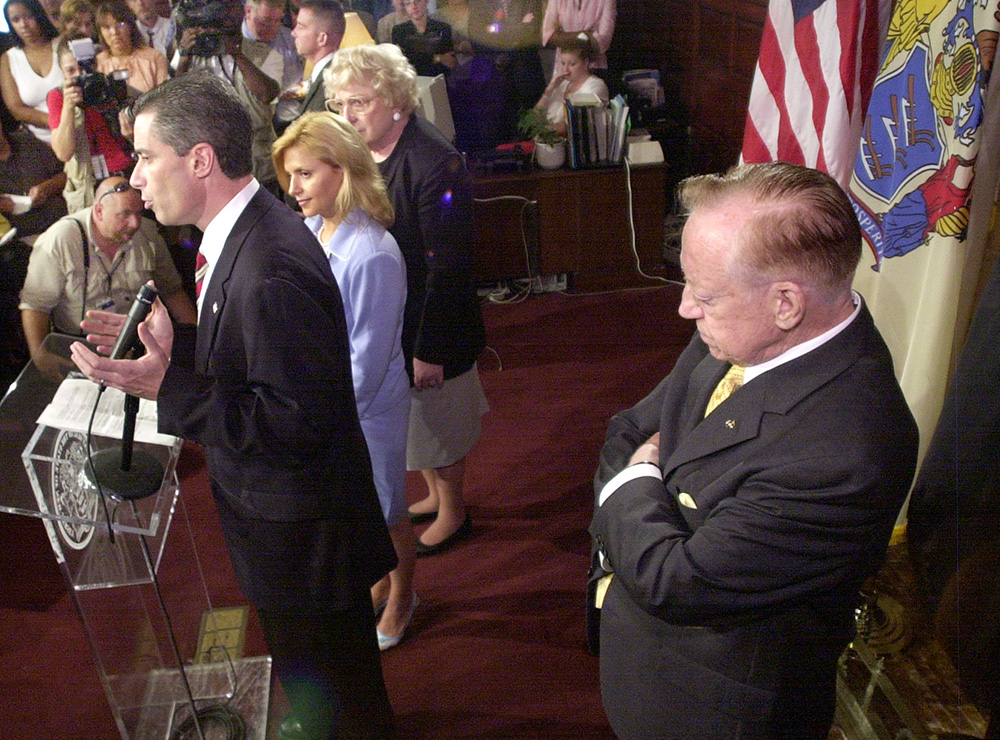
Jim McGreevey announces his resignation as governor of New Jersey at a packed news conference, with his wife, Dina Matos, and his mother, Veronica McGreevey, at his side, and his father, Jack McGreevey, behind him, at the Statehouse in Trenton, New Jersey, Aug. 12, 2004. (AP/Daniel Hulshizer)
McGreevey moved on. He left politics, earned a divinity degree from General Theological Seminary, an Episcopal institution in New York City, and applied to be ordained in the Episcopal Church, only to be rejected. Off the public radar, he's directed New Jersey Reentry, a nonprofit devoted to returning addicts and former prisoners into mainstream life.
In many ways, life after being governor has fallen into place. But in a recent phone interview, McGreevey said it has its struggles.
He recalled his seminary experience as an attempt to simply shelter himself from the storm, yet it grew into much more. "I thought it was a place where my own sense of shame and embarrassment would be understood. It became an amazing journey. I will be eternally grateful," he said.
Once atop the hurly-burly world of New Jersey politics, McGreevey moved from the lofty perch of the governor's mansion to the lowest rungs. As part of his seminary training, he worked at a center for released prisoners in Harlem and at the former Cabrini Center for Nursing and Rehabilitation on Manhattan's Lower East Side. There, he learned about others' struggles as he worked through his own.
The mayoralty election isn't till 2025, with the opening for the job created as the current mayor runs for governor. "It is a great city, an iconic city. ... It represents the American ideal," he said in a phone interview from the Jersey City offices of New Jersey Reentry, where he is executive director.
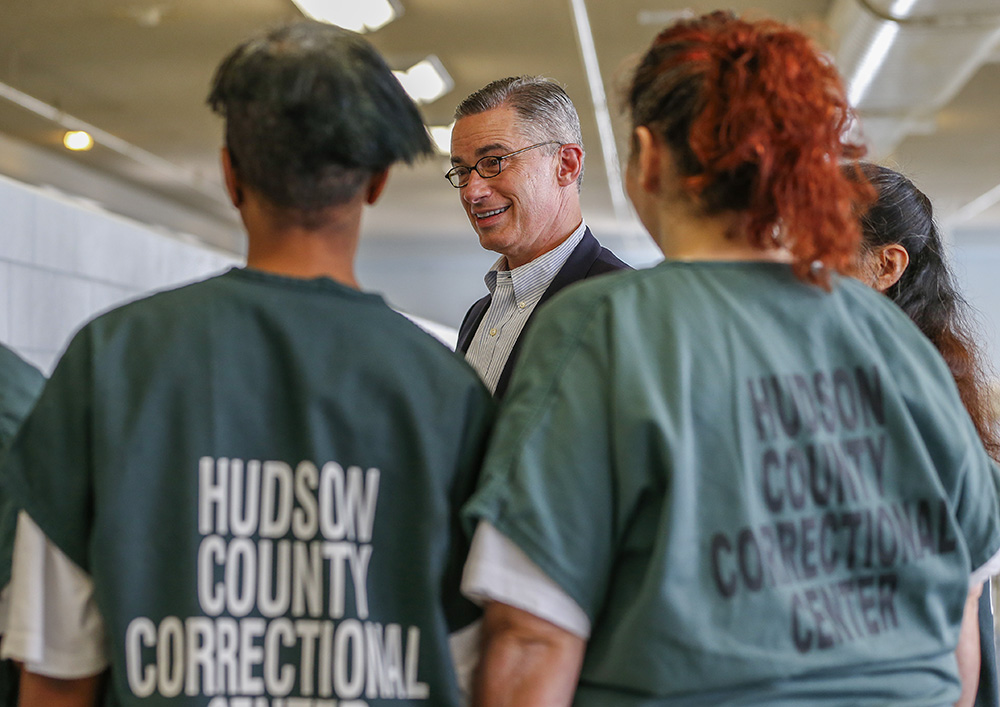
Former New Jersey Gov. Jim McGreevey talks with inmates at Hudson County Correctional Center in Kearny, New Jersey, Aug. 11, 2014. (AP/Rich Schultz)
He's running, he said, to improve the city's public schools, where 90% of the students come from families struggling economically. He wants to build more housing to relieve rising rents in a city of immigrants from Africa, the West Indies and Central America.
Part of his campaign will focus on reintroducing himself to voters.
Time has passed. An entire generation has no clue that McGreevey was once an up-and-comer, rising to the top of a state with a reputation for tough political elbows as well as its share of politicians nailed for corruption. Recently stopped by a state trooper on a New Jersey highway, McGreevey's license upon investigation revealed that he once held an important position. But the young trooper had no idea who he was, and pressed McGreevey to reveal that he is a former governor.
"Where was I?" the befuddled trooper asked.
"You were in diapers, there's no reason that you would have heard," responded McGreevey.
It's an anecdote McGreevey enjoys sharing, partly for its self-deprecating humor, while also making the point that the time since his scandal has perhaps healed old wounds.
He's taken advantage of the time. He's proud that his family stayed connected through it all; he has worked with his two former wives to raise their two children. This summer is a time of celebration: One daughter graduated from Barnard College, Columbia University; another was married in June.
Meanwhile, McGreevey has returned to his Catholic roots.
McGreevey recalled a close connection forged with his late father, the former U.S. Marine drill instructor who stood stoically next to his son at the resignation press conference. After his mother died, McGreevey would take his father to Mass at St. Joseph Church in Carteret, New Jersey, their old parish home.
The welcoming experience reinforced the ex-governor's ties to Catholicism.
It became part of his own road back to the church of his youth, which included Catholic elementary and high school.
He said that road was paved by Francis' messages of welcome to the LGBTQ community. "It's been like water in the desert," he said of the pope's public embrace of LGBTQ Catholics, the former governor willing to forgive recent controversies over the pope's disparaging description of gay clerical subculture.
Alexandra Pelosi's 2013 HBO documentary, "Fall to Grace," on McGreevey's emergence from scandal and dedication to service, reflected his tug toward spirituality and service after scandal. The writings of Andrew Sullivan and the late Jesuit Fr. John McNeill, both prominent LGBTQ Catholics, provided spiritual solace. And one of his professors at seminary was Jesuit Fr. Leo O'Donovan, former Georgetown University president, who McGreevey described as his toughest grader and mentor.
McGreevey's Catholic path led him to Christ the King Parish in Jersey City, a historically Black Catholic church, now the spiritual home of a mix of Africans, West Indians and Black Americans.
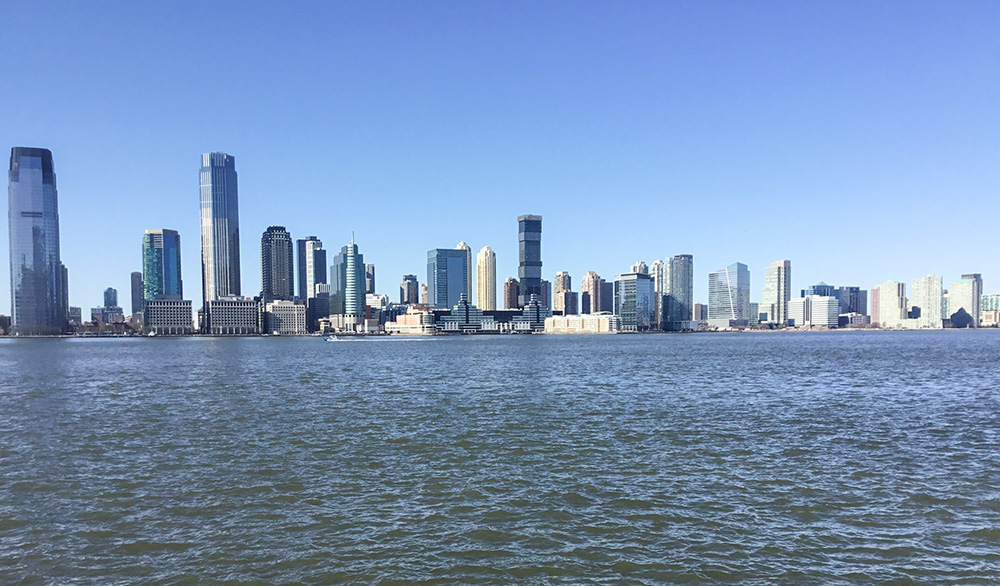
The skyline of Jersey City, New Jersey, is seen from Manhattan, New York. (Wikimedia Commons/Kidfly182)
He sees himself as a combination of traditional and progressive strands of Catholicism. He's recited the rosary with a group of largely older, women parishioners, whom he described as wise elders and faith leaders. Asked to lead the group in prayer, he demurred, for fear he wouldn't remember the rosary formula he learned in his baby boomer Catholic youth.
Few politicians wade into the waters of intramural Catholic politics, but McGreevey follows the fortunes of the church carefully and is willing to offer opinions. For one, he's surprised how his traditional friends have been turned off by Francis.
A self-described "center-left" Catholic, he said, "We play by the rules," trying to integrate papal teachings into daily life. By contrast, he finds it ironic that so many traditionalist Catholics are now spurning the current pope.
Politically, he looks back at his three years as governor as a time of nuts-and-bolts problem-solving, including a third grade literacy initiative that provided what McGreevey sees as a vital educational lift, particularly for poor kids in the state's urban areas.
McGreevey said he has taken to heart an exercise suggested by an Italian priest he met while serving at the Cabrini facility. He was told to focus on who might show up around his deathbed. Those he imagined included his daughters and two ex-wives, and a small group of friends. After that spiritual exercise, he focused on healing those relationships, realizing, he said, who is important in his life.
"We all need to give ourselves the permission to grow, to change and love, to be more fully human. Sometimes it's work," he said, citing the example of his own father, who, before he died last year, grew toward a loving acceptance of his famous son.
McGreevey now sees himself as more than a gay American, having embraced the Catholic label as well. He sees his developing Catholic faith as something he brings to his renewed effort to reenter the public realm.
"My faith grounds me in my values, my compassion, and my sense of social justice as a source of strength," he said.
Next year, waiting in judgment, will be the voters of Jersey City.

